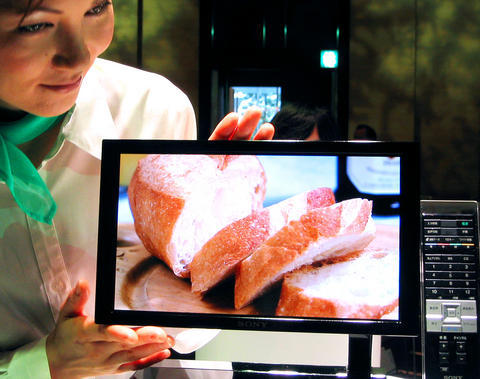Sony yesterday displayed the first television for the commercial market with an organic light-emitting diode (LED) display it said symbolized the revival of the faltering Japanese electronics maker.
The 11-inch display TV called XEL-1 -- set to go on sale on Dec. 1 in Japan for ?200,000 (US$1,700) -- measures just 3mm thick, about the same as a coin.
Plans for overseas sales are still undecided, Sony Corp said. Production is set for 2,000 units a month, it said.

PHOTO: AP
The XEL-1 uses new light-emitting display technology called OLED based on electroluminescent organic materials to deliver clear image quality, even for the color black and a metallic sheen.
Sony officials said the technology was superior to liquid-crystal and plasma displays, now widely used in thin TVs, because OLED technology uses materials that emit light on their own and don't require a backlight.
It can also relay video 1,000 times faster than liquid-crystal displays, eliminating the blur of LCD TV imagery, and reduces energy consumption by 40 percent, Sony said.
Sony, which has movie and music as well as video-game businesses, fell behind rivals in display TVs and now makes liquid crystal TVs in a partnership with rival Samsung Electronics Co of South Korea.
Sony no longer makes plasma display TVs, a market dominated by Japanese rival Matsushita Electric Industrial Co, maker of Panasonic products.
Sony president Ryoji Chubachi, in a rare appearance for a product launch, said the new TV answers criticism that Sony had failed to translate its technological prowess into attractive consumer products.
"The world's first OLED TV is a symbol of the rebirth of Sony with its superb technology," he told reporters at the firm's Tokyo headquarters.
The new TV was unveiled showing video of skyscraper lights at night, the shimmery fish skin of sushi and sparkling liquor being poured into a glass to highlight its vivid imagery.
Sony executive deputy president Katsumi Ihara said the new TV's importance may be more about corporate image than real sales. OLED TV's won't replace LCD TVs until they become available in bigger sizes and cheaper pricing, he said.
Prices have plunged in thin TVs, and a small LCD TV sells for about the tenth of the price of the XEL-1, although prices vary.
Other companies, including Samsung, are working on OLED technology. Besides pricing, another obstacle to putting OLED in a commercial product has been its life span.
The new OLED TV will last 30,000 hours, about 10 years for someone using the TV eight hours a day. An equivalent Sony LCD TV lasts twice that long, Sony said.
Ihara said new products are in the works to take advantage of the technology. When asked for specifics, he replied with a smile that they were "corporate secrets."

BIG BUCKS: Chairman Wei is expected to receive NT$34.12 million on a proposed NT$5 cash dividend plan, while the National Development Fund would get NT$8.27 billion Taiwan Semiconductor Manufacturing Co (TSMC, 台積電), the world’s largest contract chipmaker, yesterday announced that its board of directors approved US$15.25 billion in capital appropriations for long-term expansion to meet growing demand. The funds are to be used for installing advanced technology and packaging capacity, expanding mature and specialty technology, and constructing fabs with facility systems, TSMC said in a statement. The board also approved a proposal to distribute a NT$5 cash dividend per share, based on first-quarter earnings per share of NT$13.94, it said. That surpasses the NT$4.50 dividend for the fourth quarter of last year. TSMC has said that while it is eager

‘IMMENSE SWAY’: The top 50 companies, based on market cap, shape everything from technology to consumer trends, advisory firm Visual Capitalist said Taiwan Semiconductor Manufacturing Co (TSMC, 台積電) was ranked the 10th-most valuable company globally this year, market information advisory firm Visual Capitalist said. TSMC sat on a market cap of about US$915 billion as of Monday last week, making it the 10th-most valuable company in the world and No. 1 in Asia, the publisher said in its “50 Most Valuable Companies in the World” list. Visual Capitalist described TSMC as the world’s largest dedicated semiconductor foundry operator that rolls out chips for major tech names such as US consumer electronics brand Apple Inc, and artificial intelligence (AI) chip designers Nvidia Corp and Advanced

Saudi Arabian Oil Co (Aramco), the Saudi state-owned oil giant, yesterday posted first-quarter profits of US$26 billion, down 4.6 percent from the prior year as falling global oil prices undermine the kingdom’s multitrillion-dollar development plans. Aramco had revenues of US$108.1 billion over the quarter, the company reported in a filing on Riyadh’s Tadawul stock exchange. The company saw US$107.2 billion in revenues and profits of US$27.2 billion for the same period last year. Saudi Arabia has promised to invest US$600 billion in the US over the course of US President Donald Trump’s second term. Trump, who is set to touch

SKEPTICAL: An economist said it is possible US and Chinese officials would walk away from the meeting saying talks were productive, without reducing tariffs at all US President Donald Trump hailed a “total reset” in US-China trade relations, ahead of a second day of talks yesterday between top officials from Washington and Beijing aimed at de-escalating trade tensions sparked by his aggressive tariff rollout. In a Truth Social post early yesterday, Trump praised the “very good” discussions and deemed them “a total reset negotiated in a friendly, but constructive, manner.” The second day of closed-door meetings between US Secretary of the Treasury Scott Bessent, US Trade Representative Jamieson Greer and Chinese Vice Premier He Lifeng (何立峰) were due to restart yesterday morning, said a person familiar